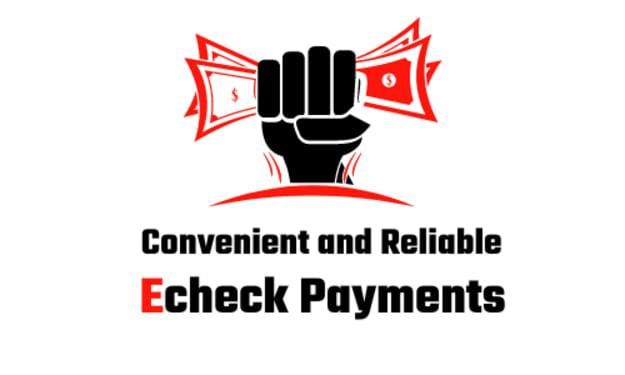Echeck Payment Processing: Minimizing Fraud and Chargebacks
Echeck Payment Processing

In today's digital age, electronic payment methods have become increasingly popular, providing convenience and efficiency for both businesses and consumers. Echeck payment processing, which enables electronic transfers of funds from a customer's bank account to a merchant, has gained significant traction. However, with the rise of echeck transactions, the risk of fraud and chargebacks has also increased. In this article, we will explore how echeck payment processing can minimize fraud and chargebacks, ensuring secure and reliable transactions.
Understanding Echeck Payment Processing
An echeck, or electronic check, is a digital version of a traditional paper check. Instead of physically writing and mailing a check, customers can authorize funds to be electronically debited from their bank account. Echeck payment processing involves several steps: authorization, verification, clearing, and settlement.
1. Authorization: The customer provides their bank account information, including the account number and routing number, to authorize the payment.
2. Verification: The provided information is verified by the payment processor to ensure the account is valid and has sufficient funds.
3. Clearing: The payment details are sent to the customer's bank for clearing, where the funds are debited from the customer's account.
4. Settlement: The cleared funds are transferred to the merchant's account, completing the payment process.
Minimizing Fraud in Echeck Payment Processing
Fraudulent activities can pose a significant threat to businesses and consumers engaged in echeck payment processing. However, several measures can be implemented to minimize the risk of fraud:
1. Encryption and Secure Communication: Echeck transactions should be conducted using secure communication channels, employing encryption protocols such as Secure Sockets Layer (SSL) or Transport Layer Security (TLS). This ensures that the data transmitted during the payment process remains confidential and protected from unauthorized access.
2. Identity Verification: Merchants should implement robust identity verification processes to authenticate the customer's identity before accepting echeck payments. This can include verifying personal information, comparing it to existing customer data, and using additional authentication methods such as two-factor authentication (2FA).
3. Address Verification System (AVS): AVS can be used to compare the billing address provided by the customer with the address on file with the issuing bank. This helps verify the customer's identity and reduce the likelihood of fraudulent transactions.
4. Velocity Checks: Monitoring the frequency and volume of echeck transactions from a particular customer or IP address can help detect potential fraudulent activity. Unusual patterns, such as a sudden increase in transaction volume or multiple transactions within a short period, may indicate fraudulent behavior.
5. Fraud Detection Tools: Utilizing advanced fraud detection tools, such as machine learning algorithms and artificial intelligence, can help identify suspicious transactions and patterns. These tools analyze various data points, including customer behavior, transaction history, and device fingerprinting, to flag potentially fraudulent transactions for further review.
Minimizing Chargebacks in Echeck Payment Processing
Chargebacks occur when a customer disputes a transaction and requests a refund from their bank. Chargebacks can be costly for merchants, leading to revenue loss and increased operational expenses. Implementing the following strategies can help minimize chargebacks:
1. Clear and Transparent Billing Descriptors: Merchants should ensure that the billing descriptors that appear on customers' bank statements clearly and accurately reflect the purchased goods or services. Confusion or ambiguity in billing descriptors can lead to customer disputes and chargebacks.
2. Responsive Customer Support: Providing excellent customer support and promptly addressing customer inquiries or concerns can help resolve issues before they escalate to chargebacks. Clear communication channels, such as phone, email, or live chat, should be readily available to customers.
3. Dispute Resolution and Mediation: Establishing an effective dispute resolution process can help resolve customer complaints and prevent chargebacks . Merchants should have a clearly defined procedure for handling customer disputes, ensuring that they are promptly addressed and resolved in a fair and timely manner.
4. Detailed Transaction Records: Maintaining comprehensive records of echeck transactions, including customer information, purchase details, and order history, can serve as valuable evidence in case of chargeback disputes. These records can be used to verify the legitimacy of a transaction and support the merchant's case during the chargeback process.
Conclusion
Echeck payment processing offers numerous benefits in terms of convenience, speed, and cost-effectiveness. However, the risk of fraud and chargebacks cannot be ignored. By implementing robust security measures, including encryption, identity verification, fraud detection tools, and chargeback prevention strategies, merchants can significantly minimize the risk of fraudulent activities and chargebacks. It is crucial for businesses to prioritize security and provide a seamless and trustworthy payment experience for their customers, ultimately fostering trust and long-term relationships.
About the Creator
eCheckplan
ECheckplan is the leading payment facilitator bridging the gap between merchants and merchant account providers.






Comments
There are no comments for this story
Be the first to respond and start the conversation.